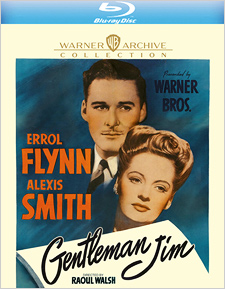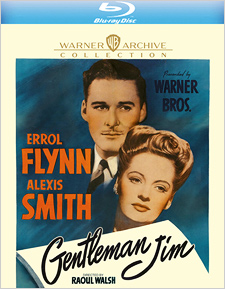Gentleman Jim (Blu-ray Review)

Director
Raoul WalshRelease Date(s)
1942 (December 12, 2023)Studio(s)
Warner Bros. (Warner Archive Collection)- Film/Program Grade: A
- Video Grade: A
- Audio Grade: A
- Extras Grade: B
Review
Emblematic Warner Bros. at the height of its powers, Gentleman Jim is the studio running on all four cylinders in this highly entertaining biopic of heavyweight boxing champion James J. Corbett (1866-1933). It was one of three 1942 releases starring Errol Flynn that made more than $2 million at the box office, an incredible amount of money at the time. No wonder they put up with his antics. Lavishly produced on a budget of $972,000 and featuring contract favorites like Jack Carson and Alan Hale (Sr.), it’s almost irresistibly fun.
In 1887 San Francisco, lowly bank clerks Jim Corbett (Flynn) and Walter Lowrie (Jack Carson) attend an illegal boxing match raided by the police. In the slammer Jim charms arrested Judge Geary (Wallis Clark), a board member of Corbett’s bank, getting him out of trouble. Boxing fan Geary, anxious to improve the sport’s image, wants to recruit gentleman fighters competing under the Marquess of Queensberry Rules, and hires former Prince of Wales coach Harry Watson (Rhys Williams) to train members of the exclusive Olympic Club.
The next day, Jim, using Victoria (Alexis Smith), daughter of club member Buck Ware (Minor Watson), bluffs his way into the club and, eventually, a tryout with Watson, he impressed by Jim’s natural abilities, which earn Jim admission into the club as an athlete. He soon, however, becomes an insufferable bore, having himself endlessly paged and putting on airs beneath his stature, prompting other members to arrange bouts with top fighters to “teach him a lesson” and put him in his place. The problem is Gentleman Jim keeps winning every fight.
After a ball in Jim’s honor where Walter, drunken and loud, is asked to leave, prompting both of them to walk out, Jim acquires an experienced manager, Delaney (William Frawley), and Jim turns pro. As Jim’s successes in the ring mount, he moves his large Irish-American family to tony Nob Hill, and pursues a career as an actor on the stage. Eventually, Jim faces his toughest challenge, a match with the legendary, seemingly unbeatable John L. Sullivan (Ward Bond) himself.
Minus his signature mustache, hedonistic Errol Flynn, who never took his career very seriously, is perfectly cast as hedonistic Gentleman Jim, and is, clearly, enjoying himself immensely. It was, reportedly, his favorite film role, and it shows. Other than a handful of inserts and long shots, like Sylvester Stallone in the later Rocky movies, it’s clearly Flynn in the ring and, a few times, it sure looks like some of the blows Jim takes and gives connect.
The film, engagingly directed by Raoul Walsh, is a big, impressive production with several huge crowd scenes, extras all in period costume, populating enormous sets taking up entire soundstages. Unlike, say, the clumsy period action-dramas Republic kept sticking John Wayne in during this time, Gentleman Jim generates a real feeling for the lively, rousing environment San Francisco must have been like in the late-1800s. One of the fight scenes occurs on a barge docked in the harbor, staged there in an attempt to circumvent anti-boxing laws. It’s a big-scale, exciting sequence, at one point Jim is knocked right out of the ring into the water.
Flynn, Smith, Carson, Hale (as Jim’s big-hearted father), etc. were all under contract to Warner Bros. and earn their pay here. Victoria’s love-hate relationship with Jim—she thinks he’s too big for his britches, and for nearly the entire film tries to knock him down a peg—is a little trite, but otherwise the picture is well-paced, with fight scenes every few minutes, interspersed with scenes of Jim charming the pants off everyone around him.
Perhaps most impressive is the casting of Ward Bond as John L. Sullivan. Bigger than life and a notorious egomaniac himself, Bond was even more like Sullivan than Flynn was like Corbett. Despite a few choice roles in pictures like The Long Voyage Home and The Maltese Falcon before this, Bond wasn’t yet a character star—he’s billed eighth in the credits—but few who saw Gentleman Jim would forget his performance. I’ve been concurrently watching Bond’s final full season on TV’s Wagon Train (before his sudden death in 1960) and he’s quite awful on those later shows. (Bond’s egomania again reared its head and his good performances in Season 1 give way to indulgent awfulness later.) Yet, near the end of Gentleman Jim is an underplayed post-fight scene between Bond and Flynn that’s quite unexpectedly touching, reminding us was a great, underrated actor Bond could be.
Warner Archive’s Blu-ray of Gentleman Jim, in its original 1.37:1 standard frame and in black-and-white, is an effectively flawless transfer. The DTS-HD Master Audio (2.0 mono) is also well above average. Optional English subtitles are provided and the disc is Region-Free.
One complaint is that the film is preceded by the following warning/disclaimer: “The program you are about to see is a product of its time. It portrays ethnic, racial, gender, and other stereotypes and biases that existed in our society at the time this program was made. While such portrayals do not represent the values of Warner Bros. Discovery and its affiliates, this program is being presented in its original form in order to reflect the existence and history of these stereotypes and biases.” This is probably Warner Bros. covering its legal ass more than overt political correctness, but a) this is the first time I’ve encountered such a disclaimer on anything other than cartoons owned by Warner Bros., and, b) one can only wonder just what ethnic, racial, gender, or other stereotype they thought Gentleman Jim was guilty of offending. The film revolves primarily around Irish-Americans but, somewhat rare for a film of this type, none could be described as stereotypes. During a stage performance by Sullivan a single, presumably white actor with no lines is fleetingly glimpsed, for all of five seconds, in blackface, a historically accurate depiction of such 19th century shows, and a single African-American servant also turns up for even less time to hand Sullivan his hat and coat. Such a fuss over absolutely nothing.
Supplements consist of three one-reel cartoons, all from 1942: The Dover Boys at Pimento University, Foney Fables, and Hobby Horse-Laffs. Also included is a trailer and, audio-only, a Lady Esther Screen Guild Playhouse radio version of Gentleman Jim featuring both Flynn and Smith.
A real crowd-pleaser, Gentleman Jim is best enjoyed with a roomful of friends and highly recommended.
- Stuart Galbraith IV

